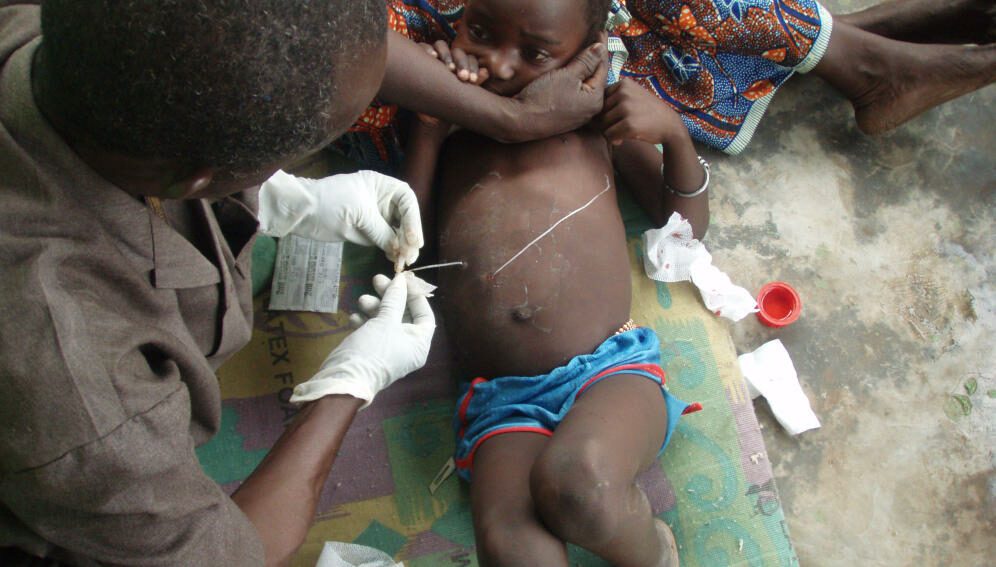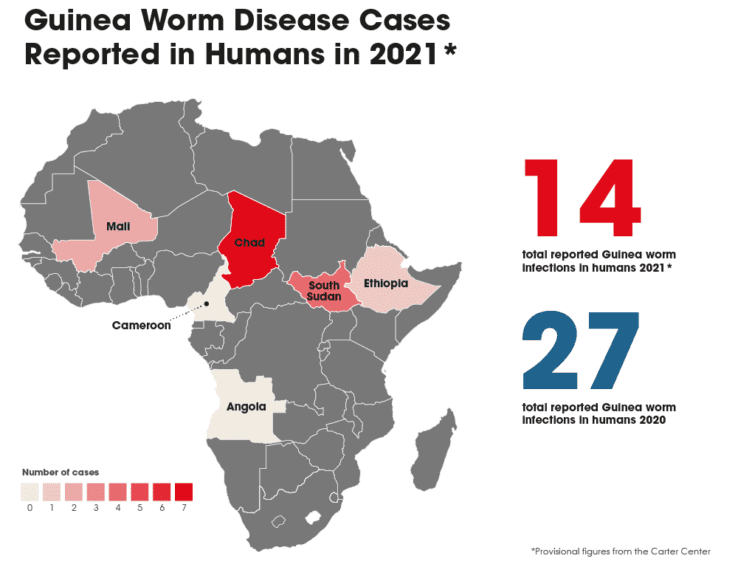01/02/22
Eradication push urged as Guinea worm cases fall

By: Sanjeet Bagcchi
Send to a friend
The details you provide on this page will not be used to send unsolicited email, and will not be sold to a 3rd party. See privacy policy.
The number of human cases of Guinea worm disease halved in 2021 to a record low of 14, putting the goal of global eradication in sight, the US-based Carter Center has announced.
The parasitic disease is caused by consumption of water contaminated with water fleas, known as copepods, which carry the larvae of the parasite. It affects people in remote and deprived communities who rely on open stagnant water sources such as ponds for drinking.
Carter Center CEO Paige Alexander said eradication was “an approaching reality” thanks to successful interventions by national health ministries, but added: “We need to keep pressing to the finish line.”
According to the World Health Organization (WHO), Guinea worm disease is not usually fatal, but people suffering from it become “non-functional” for weeks and months.
“Eradication is an approaching reality. The national ministries of health, with our support, have implemented interventions that are working, and the result is a measurable reduction in human suffering and animal infections.”
Paige Alexander, Carter Center CEO
There is no vaccine or medicine for the disease, however community-based interventions, such as teaching people to filter drinking water, have led to significant reductions in recent years, despite the onset of COVID-19, according to the non-profit Carter Center.
Adam Weiss, director of the Carter Center’s Guinea worm eradication programme, told SciDev.Net: “In the face of a global pandemic, volunteers and local staff carried out household visits to provide health education, distribute filters, and protect water sources from being contaminated.
“In addition, the most endemic country, Chad, began limiting the movement of domestic dogs, which was an intervention developed in Ethiopia.”
Chad reported just seven human cases of Guinea worm disease in 2021 — down from 12 the previous year, according to provisional figures from the charity.
Four cases were reported in South Sudan, two in Mali, and one in Ethiopia, while Angola and Cameroon, which each had one human case in 2020, had none in 2021.
In the same period, animal cases of the disease fell by 45 per cent. The majority of animals affected were in Chad, which reported 855 cases, mostly in dogs.
The update by the Carter Center coincided with World Neglected Tropical Diseases Day on 30 January. It comes after the WHO said earlier this month that the disease was on the verge of eradication.

Guinea worm disease, or Dracunculiasis, is classed as a Neglected Tropical Disease (NTD) and is caused by a parasite called Dracunculus medinensis.
When the larvae enter the body, they mature and mate. “After about a year, a meter-long female worm emerges slowly through an excruciatingly painful blister in the skin, often of the legs or feet,” the Carter Center says.
“A sufferer may seek relief by dipping the affected limb in water. However, contact with water stimulates the emerging worm to release its larvae into the water and start the process all over again.”
In the mid-1980s, the disease was endemic in 20 countries, with an estimated 3.5 million annual cases (17 in Africa and three in Asia).
The Carter Center, founded by former American president Jimmy Carter, took up a global campaign to eradicate Guinea worm disease in 1986, working in collaboration with national programmes, the WHO, UNICEF, and other partners.
Ifeanyi Nsofor, senior vice-president for Africa at the Human Health Education and Research Foundation, said the achievements were “commendable”, but added: “It is quite disheartening that this disease still affects poor communities.”
He said increased advocacy and investment were needed to raise Guinea worm disease and other NTDs on the global health agenda and achieve full eradication.
“The continued reduction in Guinea worm cases globally reinforces that social determinants of health such as provision of clean water and improvements in sanitation are very crucial…[for the] prevention of infectious diseases,” he added.
Smallpox is the only disease affecting humans ever to have been eradicated, in 1980. For a disease to be declared eradicated, every country in the world must be certified free of human and animal infection, even if no transmission has taken place there.
Isaac Olufadewa, executive director of the Slum and Rural Health Initiative in Nigeria, said there was a need to “leverage more offline and online innovative technologies”.
This piece was produced by SciDev.Net’s Global desk.














